More on this book
Community
Kindle Notes & Highlights
by
Jim Holt
Read between
June 2 - July 11, 2020
It has been said that the question Why is there something rather than nothing? is so profound that it would occur only to a metaphysician, yet so simple that it would occur only to a child.
The problem with the science option would seem to be this. The universe comprises everything that physically exists. A scientific explanation must involve some sort of physical cause. But any physical cause is by definition part of the universe to be explained. Thus any purely scientific explanation of the existence of the universe is doomed to be circular.
“Je n'avais pas besoin de cette hypothèse.”)
Consider, Philo says, the following arithmetical curiosity. If you take any multiple of 9 (like 18, 27, 36, etc.) and add up the digits (1 + 8, 2 + 7, 3 + 6, etc.), you always get 9 back again. To the mathematically naive, this might appear a matter of chance. To the skillful algebraist, by contrast, it is immediately seen to be a matter of necessity.
Ayer said, “you asked a question like ‘Where do all things come from?’ Now that’s a perfectly meaningful question as regards any given event. Asking where it came from is asking for a description of some event prior to it. But if you generalize that question, it becomes meaningless. You’re then asking what event is prior to all events. Clearly no event can be prior to all events. Because it’s a member of the class of all events it must be included in it, and therefore can’t be prior to it.”
If you turn on your television and tune it between stations, about 10 percent of that black-and-white speckled static you see is caused by photons left over from the birth of the universe. What greater proof of the reality of the Big Bang—you can watch it on TV.
But that is interesting. Picture the reverse of the process: not 1 and –1 coming together to make 0, but 0 peeling apart, as it were, into 1 and –1. Where once you had Nothing, now you have two Somethings! Opposites of some kind, evidently. Positive and negative energy. Matter and antimatter. Yin and yang.
Even more suggestively, –1 might be thought of as the same entity as 1, only moving backward in time.
In the absence of time, –1 and 1 cancel; they coalesce into zero. Time allows the two opposites to peel apart—and it is this peeling apart that, in turn, marks the emergence of time. It was thus, Atkins proposes, that the spontaneous creation of the universe got under way.
Does the empty set exist? Can there be a Something whose essence—indeed, whose only feature—is that it encompasses Nothing?
Nothing is popularly held to be better than a dry martini, but worse than sand in the bedsheets. A poor man has it, a rich man needs it, and if you eat it for a long time, it’ll kill you.
Take the word nothing … I see this nothing and it is something.… So I turned to my wife and asked her what nothing meant.… She simply said: “Nothing means there is nothing.” I understood it differently. I saw this nothing.… If nothing can appear to a person, that means it is something. That’s where the trouble comes in.
Even when all the contents of the cosmos have been imaginatively banished, the argument goes, we are always left with the abstract setting that they inhabited. This setting may be empty, but it is not nothing. A container with no contents is still a container. Let’s call this the “container argument” against nothingness.
Although my birth was contingent, my death is necessary. Of that I am reasonably sure. Yet I find my death difficult to imagine.
Just as each of us came into existence through an act of our parents, the priest says, so the universe must have come into existence through an act of a creator. Au fond de la question est une cause première—Dieu. He adds that God was not the first cause in a temporal sense, since God created time itself. God was behind the Big Bang, but not prior to it.
The existence of the universe is purely a matter of chance quantum fluctuations, he says. Just as a particle and its antiparticle can spontaneously arise out of a vacuum, so too can the seed for an entire universe. So quantum theory accounts for why there is something rather than nothing. Nôtre univers est venu par hasard d’une fluctuation quantique du vide. Our universe arose by chance from a quantum fluctuation in the void. And that’s the end of it.
As a Buddhist, he says, he believes that the universe had no beginning. Il n’y a pas de début. Nothingness—le néant—could never give way to being, he says, because it is defined in opposition to that which exists. A billion causes could not make a universe come into existence out of what does not exist. That is why, the monk says, the Buddhist doctrine of a beginning-less universe makes the most metaphysical sense. C’est encore plus simple.
Philosophy, n. A route of many roads leading from nowhere to nothing.


